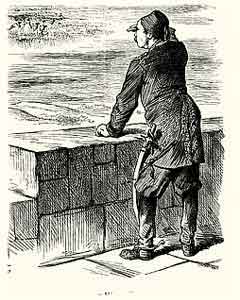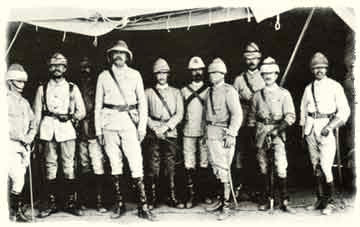
January 1884: “There will be an awful fuss about this at home”
Baker’s relief column advanced up-river in an open square to break the siege of Khartoum, with its open flank guarded by Egyptian cavalry. For several hours Gordon, anxiously watching for the relief column from the roof of the Residency, was unconvinced that the troops advancing towards him through the dust clouds were friendly – the presence of local scouts alongside the European police persuading him that this might be an enemy ruse. As a result, Hicks was ordered not to advance beyond the fortifications, which they held with some success throughout the battle, despite repeated assaults by fierce Hadendowa tribesmen.

At first it seemed that Baker’s plan would succeed – several Mahdist infantry and cavalry ‘rub were provoked into attacking the formation piecemeal, which formed line without undue disruption and directed heavy volley and artillery fire at the advancing hordes. However, a suicidal charge by Baggara horsemen into the Sudanese battalion under Baker’s direct command disrupted the formation sufficiently for the enemy infantry to come up in overwhelming numbers. One Egyptian battalion broke and ran, leaving a gap into which the Dervish poured, overwhelming the Nordenfeldt crews, who died by their guns. Artillery and machine gun fire from the ‘Fashoda’ guarding the left flank against a second Baggara cavalry charge proved counter-productive, inflicting more casualties on the Egyptian cavalry there (and badly wounding Col. Burnaby in the process) than on the enemy and it was only the timely intervention of the Circassian lancers, charging into the flank of, and breaking, the enemy cavalry that saved the day.
With the line starting to collapse, Tewfiq Bey bravely led the right flank cavalry on a suicidal charge against the Ansar to his front, to hold open the road back to Wad Hamed. In this he was assisted by the wild Watusi horsemen who successfully charged into the flank of other rebels who were distracted by the wholesale massacre of fleeing Egyptians. Colonel Stewart then brought up the IVth Sudanese, whose devastating volley fire once again unfortunately hit more of the routing fellahin than it did their pursuers. At this point General Baker ordered a general retreat to Wad Hamed, abandoning his supplies and artillery train on the way. With such an event-filled battle, it is hoped that a more detailed battle-report will follow from Mr. Russell (of the Times) once the intelligence department has studied the reports of the surviving officers involved.
Although casualties suffered were comparatively light given the situation (about 800 men killed) and enemy losses significantly greater (estimated at 3-4500 killed and wounded), the failure of the relief column is a severe setback. Furthermore, the Government refuses to authorize the deployment of further troops to the region until senior British officers are able to provide a clearer picture of the situation and its likely outcome.
Further bad news has reached us too, that the town of Abu Hamed has been captured and the entire population massacred by the rebels. It also appears likely that the same fate will soon befall Berber, where supplies have almost been exhausted and the morale of the garrison is very low.
There are also rumours that Abyssinian forces under King John attacked the town of Fashoda (in the deep south), but were driven off with heavy losses by the Mahdist defenders. Storms in the Red Sea have necessitated the temporary withdrawal of the Royal Navy to Aden, although several gunboats have been deployed in Suakin harbour to support its defences, should the Hadendowa attempt another surprise attack.
Elsewhere, General Graham’s BEF brigade has traversed the deserts of the Eastern Sudan without incident and is now poised to attempt their own relief of Khartoum, although some junior officers are advocating a march north, to secure the Northern District as a buffer against a possible Mahdist invasion of Egypt, even if this means leaving Gordon to his fate.
Having sent Tewfiq Bey on ahead with the cavalry brigade (where he had joined up with Baker), Wolseley has followed on with the Egyptian infantry (at their more sedate pace), reaching the wells of Abu Klea unopposed. The ‘Metemmeh’ reconnoitred further upriver, coming under heavy artillery fire while traversing the 4th cataract and was forced to withdraw to Dongola for repairs.
Word in the bazaars is that the defeat of the relief column and the fall of Abu Hamed has stiffened enemy resolve and encouraged greater support amongst the populace for the rebel cause. It is essential that the rebellion be suppressed, preferably violently, before it spreads to such an extent that it cannot be contained and the Sudan has to be abandoned.

In at the Death: Khartoum February 1884
“When the guns haven’t come up, and your cavalry’s checked by close country, and you’re waiting in the hot, dusty hush for the faint rumble of impi, rub, or haka over the skyline and know they’re twenty to your one – well, that’s when you realize that it all hangs on that double line of yokels and town scruff with their fifty rounds a man and a Martini-Henry bayonet. Wellington himself may have placed ’em just so, with D’Israeli’s sanction, The Times’ blessing, and the Queen waving ’em good-bye — but now it’s their grip on the stock, and their eye on the backsight, and if they break, you’re done. Haven’t I stood shivering behind ’em often enough, wishing I could steal a horse from somewhere?”
Memoirs: Sir Harry Paget Flashman. Brigadier-General, VC, KCB, KCIE.
Generals Wolseley and Graham successfully rendezvoused with Baker at Wad Hamed. A week was spent reorganizing the army, with Wolseley (naturally) assuming overall command. The commissariat reports that there are insufficient supplies available that might be used to prolong the siege (beyond what is needed to maintain the army) – unless the relief column can break through within the next week or so, Khartoum will surely fall to the Mahdi. Intelligence reports suggest that fresh Dervish reinforcements have moved up from the hinterland, buoyed up by the defeat of Baker Pasha. Attempts by the ‘Fashoda’ to reach the city have had to be called off; such was the hail of fire from enemy artillery batteries entrenched on either side of the river.

General Sir Garnet Wolseley, as well as being Commander in Chief, has assumed operational command of the 1st (Anglo-Sudanese) brigade of the 1st Division, with Tewfik Bey (Egyptian army) as his ADC. Baker Pasha commands the 2nd (Egyptian) brigade. General Sir Gerald Graham VC (pictured with his staff, right) commands the 2nd Division, with operational command of the 1st British (Highland) brigade, with Colonel Stewart (11th Hussars) as his ADC. Lieutenant General Redvers Buller VC commands the 2nd British brigade. Colonel Fred Burnaby (The Blues) remains incapacitated by his wounds but has insisted on remaining with the column, albeit confined to a camel-borne cacolet, and accompanied by his faithful gun bearer.
It is now about 7am on the 21st February 1884. The army decamped from its defensive zeriba at dawn and has marched in near silence for the last two hours, following the banks of the Nile upstream towards Khartoum.
The army, numbering approximately 7700 regulars and supported by another 800 native levies, is advancing in an open square formation, with one flank protected by the river. Rough ground has made it difficult to maintain this formation sometimes but good progress has been made. The city can now be discerned on the horizon, although the undulating terrain, rough vegetation and intermittent dust storms have hindered visibility during the march.
Suddenly, there is a commotion, cries of alarm and a fusillade of shots from both the right flank and up ahead. A few men fall to the ground, some clearly dead, more wounded. Major Kitchener, in Arabic robes and mounted on a native pony, with whiskers bristling and blue eyes flashing, gallops through the lines firing his pistol into the air as if it were necessary to raise the alarm. Almost simultaneously, ‘fazands of native warriors break from concealed positions and hurl themselves at the advancing columns – the army has been ambushed! “Form up, Form up” comes the frantic call from the ranks… but will the few valuable seconds gained by Kitchener be enough to avert a disaster…
…Whether Hicks will attempt to intervene (assuming that he recognizes that the column is under attack) remains to be seen. If the column fails this time, Khartoum will surely fall, the fate of Gordon and the garrison will be grisly and the eventual suppression of the revolt made far more difficult, especially if public opinion at home turns against the Army.
One thought on “Fire & Sword in the Sudan: January-February 1884”